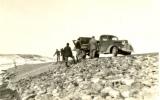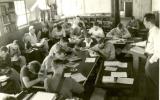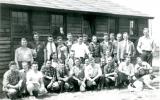CPS Unit Number 067-01
Camp: 67
Unit ID: 1
Operating agency: MCC
Opened: 11 1942
Closed: 2 1946
Workers
Total number of workers who worked in this camp: 327
-
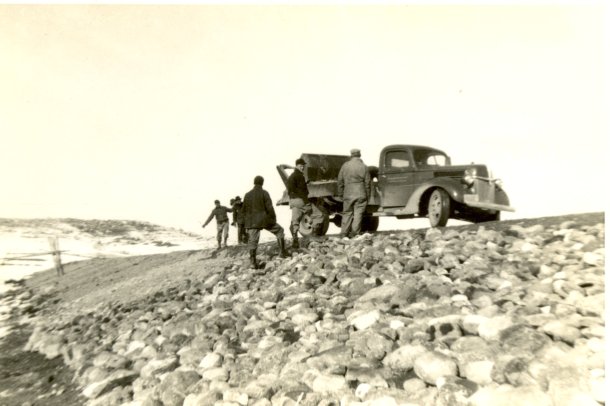 CPS Camp No. 67, Downey, IdahoCivilian Public Service camp 67, Downey, Idaho.Photo 164 Box 2, Folder 6. MCC Photographs, Civilian Public Service, 1941-1947. IX-13-2.2. Mennonite Central Committee Photo Archive
CPS Camp No. 67, Downey, IdahoCivilian Public Service camp 67, Downey, Idaho.Photo 164 Box 2, Folder 6. MCC Photographs, Civilian Public Service, 1941-1947. IX-13-2.2. Mennonite Central Committee Photo Archive -
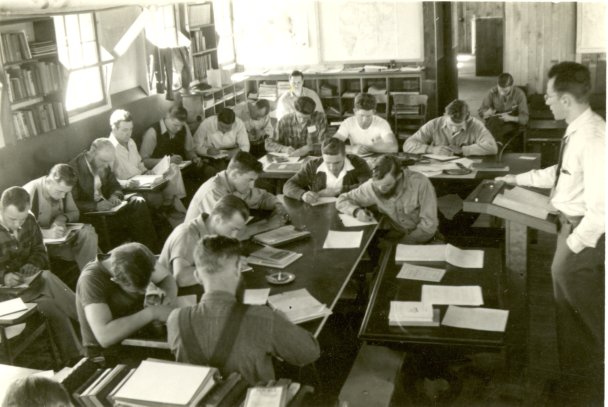 CPS Camp No. 67, Downey, IdahoCivilian Public Service camp 67, Downey, Idaho. Side camp leaders' training school, Downey, Idaho.Photo 165 Box 2, Folder 67. MCC Photographs, Civilian Public Service, 1941-1947. IX-13-2.2. Mennonite Central Committee Photo Archive
CPS Camp No. 67, Downey, IdahoCivilian Public Service camp 67, Downey, Idaho. Side camp leaders' training school, Downey, Idaho.Photo 165 Box 2, Folder 67. MCC Photographs, Civilian Public Service, 1941-1947. IX-13-2.2. Mennonite Central Committee Photo Archive -
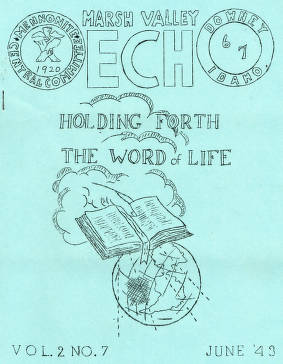 CPS Camp No. 67Marsh Valley Echo was a newsletter published by the men at Camp 67 from December 1942 to October 1945.Digital Image from American Friends Service Committee: Civilian Public Service Records (DG002), Swarthmore College Peace Collection, Swarthmore, Pennsylvania
CPS Camp No. 67Marsh Valley Echo was a newsletter published by the men at Camp 67 from December 1942 to October 1945.Digital Image from American Friends Service Committee: Civilian Public Service Records (DG002), Swarthmore College Peace Collection, Swarthmore, Pennsylvania -
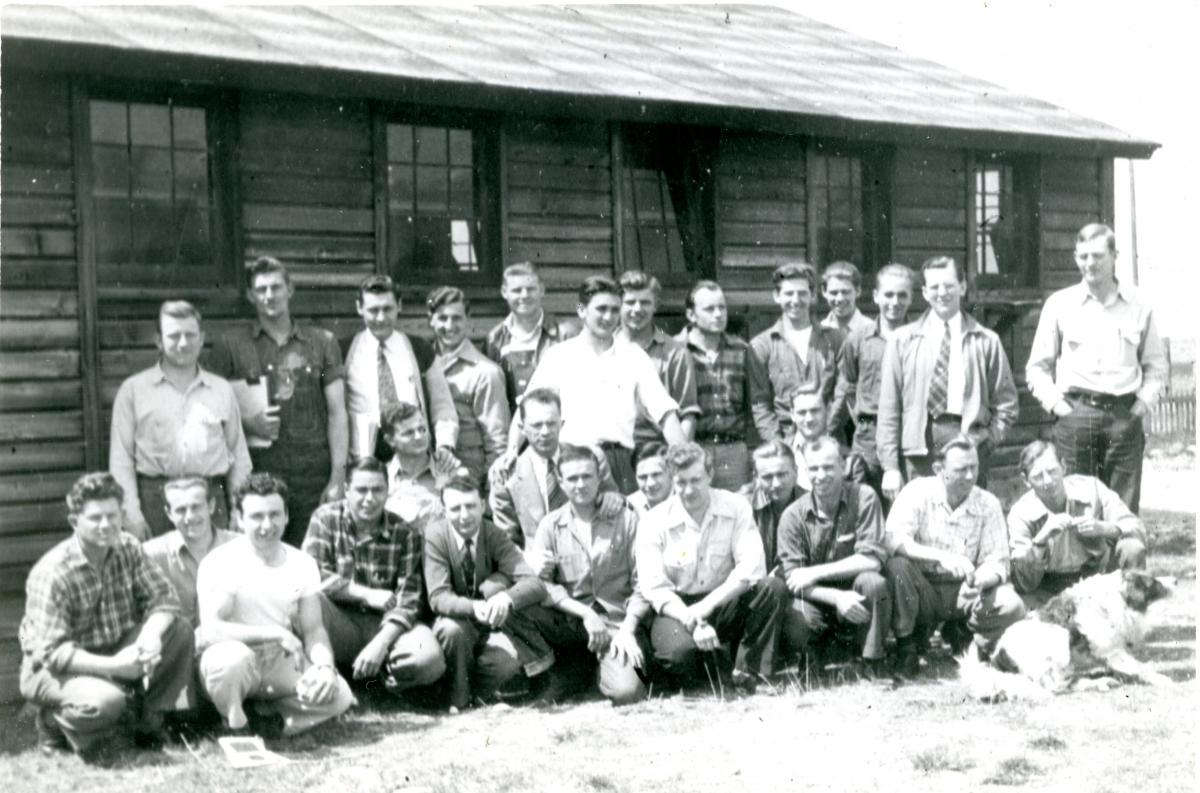 CPS Camp # 67, Downey, CAMennonite Central Committee Archival Photo
CPS Camp # 67, Downey, CAMennonite Central Committee Archival Photo
CPS Camp No. 67, a Soil Conservation base camp located near Downey, Idaho operated by Mennonite Central Committee, opened in November 1942 and closed in February 1946. The men worked in construction and improved irrigation systems on farms in the area.
Camp Downey was located a half mile east of Downey and forty miles south of Pocatello in the southeastern part of Idaho.
Directors: Ora Keiser, Dale Nebel, Orin Beechy, John Schmidt
Dietician: Vella Burkholder, Wilma Hess, Mrs. Victor Janzen
Matron: Mrs. David L. Ebersole, Curlew Side Camp, Mrs. Ora Keiser, Mary E. Wenger
Nurse: Susie Schmidt
The first group of men transferred in from CPS Camp No. 22 at Henry, Illinois after it closed in November 1942.
Typically, men in the MCC camps tended to report Mennonite and Amish denominational affiliations when entering CPS. They more frequently came from rural rather than urban areas of the country.
Men in Mennonite camps and units reported on average 10.45 years of education when entering CPS, with nearly twenty-two percent having completed eon or more years of college or graduated, as well as enrollment in graduate and post graduate work. (Sibley and Jacob p. 171)
Men worked primarily in the construction and improvement of irrigation systems on farms in the area. They planted trees, built soil flumes, laid tile drainage ditches, built earth fills and stock ponds, and surveyed for contour farming. They spent considerable time harvesting sugar beets, potatoes and hay crops in the summers.
Men also worked in the side camps at Curlew Valley near Holbrook, Idaho, and in the Gem Valley near Grace. At Curlew Valley the men worked in a land utilization program while the Gem Valley project work proved very similar to the work at Camp Downey.
Since men regularly moved in and out of the camp to other CPS locations, orientation and training for the work at Downey became an important part of the camp education program. Downey offered a week long orientation that included emphasis on understanding MCC policy and camp philosophy, the importance of group work and life, organization of the camp, goals for personal growth, and understanding of the work project. The men toured work projects and attended mini conferences on various aspects of project work as part of the orientation.
One of the camp assignees trained as a project training assistant and worked with the project superintendent as well as the camp director. He worked full time in that capacity beginning in the fall of 1943.
The camp offered a regular on-going education program consisting of films, slides, and speakers related to soil conservation.
During the summer of 1945, John Thut offered a music institute at the camp. These short courses focused on sight singing, hymnology, music appreciation and choral literature.
The men at Downey made hooked rugs, a recreational activity found at a number of CPS camps.
To assist in religious life at the camp, A. Warkentin served in pastoral ministry for a time in 1945.
The men published a camp paper Marsh Valley Echo from December 1942 through October 1945. They also published Junior Echo and one issue Vol. II No. 45 (December, 1945) is housed in the Swarthmore College Peace Collection CPS archival collection.
For more information on soil conservation camps, see Melvin Gingerich, Service for Peace: A History of Mennonite Civilian Public Service. Akron, PA: Mennonite Central Committee printed by Herald Press, Scottdale, PA, 1949, Chapter X pp 108-124; Chapters XIX and XX on Education in CPS Camps pp. 295-337, and Chapter XVIII Religious Life in CPS Camps pp. 276-294.
For more information on women COs see Rachel Waltner Goossen, Women Against the Good War: Conscientious Objection and Gender on the American Home Front, 1941-47. Chapel Hill, NC: The University of North Carolina Press, 1997.
See also Albert N. Keim, The CPS Story: An Illustrated History of Civilian Public Service. Intercourse, PA: Good Books.
For an in depth history of conscientious objection in the United States, see Mulford Q. Sibley and Philip E. Jacob, Conscription of Conscience: The American State and the Conscientious Objector, 1940-1947. Ithaca, NY: Cornell University Press, 1952.
Swarthmore College Peace Collection, Camp publications database.
